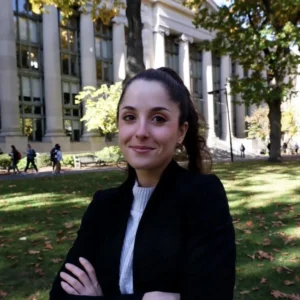Supporting evolving economic needs and wellbeing in the Consumer Protection Clinic
Jan 31, 2024 By Lorea Mendiguren ‘24, Originally Published in Harvard Law School Today
To be an American is to be a consumer. Daily, we trade currency for products, services, and expectations. As participants in a market economy, economic wellbeing is a determinative factor of quality of life and civic prosperity.
The field of consumer protection identifies barriers to economic wellbeing and harness legal protections to ensure financial self-determination. The Consumer Protection Clinic undertakes this work, representing clients who face a variety of economic and legal harms.

The bulk of the caseload is made up of debt collection lawsuits. As part of an over $20 billion U.S. debt collection market, debt buyers purchase debts that creditors (such as banks or stores with credit cards) write off. They buy in bulk, paying cents on the dollar for sizable debts, and then bring suit against debtors for the full amount. Monday and Thursday mornings are often spent at the West Roxbury and Dorchester courthouses, offering the clinic’s free services to those facing suit.
The clinic also takes on affirmative cases. My longest-running case concerned unfair and deceptive practices (UDAP) by a solar panel provider—a national issue that has prompted various state AGs to bring lawsuits and raise alerts concerning an array of consumer harms, including misrepresentation of costs and savings, property damage, and excessive solicitation and robo calls. My client was one of thousands of consumers experiencing financial strain due to a solar company’s UDAP, misled into a multi-decade contract with dysfunctional solar panels, increasing solar costs, and unreduced electricity bills. I worked closely with him to develop our approach, ultimately sending the solar company a Chapter 93A demand letter pursuant to Massachusetts consumer protection law.
In the clinic, you are an authorized attorney. Alexa Rosenbloom and Roger Bertling, the clinic’s dedicated and all-knowing supervisors, always have their doors open to discuss strategy—but you meet with the clients, represent them at their hearings, communicate with opposing counsel, and so on. Forming a professional relationship with clients and working through strategic options with them is deeply fulfilling. Consumer harms have substantial impacts on clients’ lives and resources, but the clinic empowers you to mitigate their financial strain.
The consumer protection seminar complements the clinic, examining pervasive issues including debt buying and collection, UDAP, and predatory loan practices. The class contextualizes these issues and works through pragmatic legal approaches to use if (and when) such disputes arise in clinical work.
What’s more, it creates space to develop your own inquiries about consumer protection issues. I was drawn to the clinic by interest in a related area of consumer protection—data protection—and sought to develop a foundational understanding of the broad legal space and predominant types of disputes. The seminar gave me a chance to consider the relationship between traditional consumer protection issues and an increasingly online world.
In our final assignment, Ali Godoy and I presented on buy now, pay later loans (BNPL), a payment option that has become mainstream in e-commerce. A BNPL provider pays for a consumer’s purchase and becomes their lender, to be repaid in four installments. Framed as a form of payment at checkout, consumers tend not to view BNPL as a type of credit and are likely to increase their spending when using it, at times beyond their means. We each took the opportunity to explore a subtopic in detail. Ali discussed demographic trends among BNPL users and noted high rates of usage among low-income and Gen Z consumers. I considered ties to data protection law, including the potential for profiling and targeting in BNPL apps and use of dark patterns—deliberately misleading design elements in software—in BNPL offers.
In the ever-changing commercial and digital world, there are new needs that consumer protection efforts are evolving to meet. Protections for consumers are crucial to ensure that individuals can enjoy economic mobility and self-determination. Contributing to this work with the clinic is impactful and edifying. I am very thankful for the experience, and highly encourage anyone interested in supporting harmed consumers to join the Consumer Protection Clinic for a semester!
